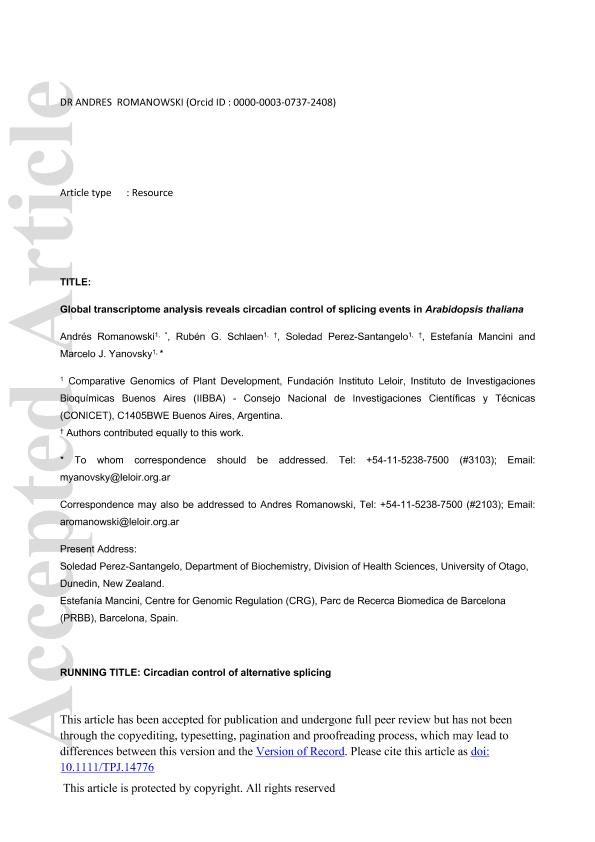Artículo
Global transcriptome analysis reveals circadian control of splicing events in Arabidopsis thaliana
Romanowski, Andrés ; Schlaen, Rubén Gustavo
; Schlaen, Rubén Gustavo ; Perez Santangelo, Maria Soledad
; Perez Santangelo, Maria Soledad ; Mancini, Estefania
; Mancini, Estefania ; Yanovsky, Marcelo Javier
; Yanovsky, Marcelo Javier
 ; Schlaen, Rubén Gustavo
; Schlaen, Rubén Gustavo ; Perez Santangelo, Maria Soledad
; Perez Santangelo, Maria Soledad ; Mancini, Estefania
; Mancini, Estefania ; Yanovsky, Marcelo Javier
; Yanovsky, Marcelo Javier
Fecha de publicación:
05/2020
Editorial:
Wiley Blackwell Publishing, Inc
Revista:
Plant Journal
ISSN:
0960-7412
Idioma:
Inglés
Tipo de recurso:
Artículo publicado
Clasificación temática:
Resumen
The circadian clock of Arabidopsis thaliana controls many physiological and molecular processes, allowing plants to anticipate daily changes in their environment. However, developing a detailed understanding of how oscillations in mRNA levels are connected to oscillations in co/post-transcriptional processes, such as splicing, has remained a challenge. Here we applied a combined approach using deep transcriptome sequencing and bioinformatics tools to identify novel circadian-regulated genes and splicing events. Using a stringent approach, we identified 300 intron retention, eight exon skipping, 79 alternative 3' splice site usage, 48 alternative 5' splice site usage, and 350 multiple (more than one event type) annotated events under circadian regulation. We also found seven and 721 novel alternative exonic and intronic events. Depletion of the circadian-regulated splicing factor AtSPF30 homologue resulted in the disruption of a subset of clock-controlled splicing events. Altogether, our global circadian RNA-seq coupled with an in silico, event-centred, splicing analysis tool offers a new approach for studying the interplay between the circadian clock and the splicing machinery at a global scale. The identification of many circadian-regulated splicing events broadens our current understanding of the level of control that the circadian clock has over this co/post-transcriptional regulatory layer.
Archivos asociados
Licencia
Identificadores
Colecciones
Articulos(IIBBA)
Articulos de INST.DE INVEST.BIOQUIMICAS DE BS.AS(I)
Articulos de INST.DE INVEST.BIOQUIMICAS DE BS.AS(I)
Citación
Romanowski, Andrés; Schlaen, Rubén Gustavo; Perez Santangelo, Maria Soledad; Mancini, Estefania; Yanovsky, Marcelo Javier; Global transcriptome analysis reveals circadian control of splicing events in Arabidopsis thaliana; Wiley Blackwell Publishing, Inc; Plant Journal; 103; 2; 5-2020; 889-902
Compartir
Altmétricas



